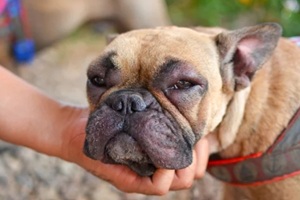 Pets are great companions, but they are not always clear communicators. Unusual or repetitive behaviors often confuse their owners. You or your pet sitter may notice that your dog is scratching themselves incessantly, and you wonder if you forgot your dog’s flea preventative. Yet, the most likely cause, especially in the spring and summer months, is allergies.
Pets are great companions, but they are not always clear communicators. Unusual or repetitive behaviors often confuse their owners. You or your pet sitter may notice that your dog is scratching themselves incessantly, and you wonder if you forgot your dog’s flea preventative. Yet, the most likely cause, especially in the spring and summer months, is allergies.
Yes, pets can get allergies just like humans can. While it is extremely rare for a pet to have a fatal allergic reaction to something, it is common for them to suffer from some of the same symptoms people associate with spring: a runny nose, sneezing, and more. Fortunately, there are several things you can do to alleviate your pet’s allergies.
Understanding Pet Allergies
External factors, such as pollen or dander, trigger your pet’s immune system and give them allergy symptoms. The immune system mistakenly treats these substances as dangerous, eliciting a fast response to get rid of them.
Inflammation may cause itching as tissues swell to block the particles, the nose might start running to flood the unwanted visitors out of the nasal cavity, and more. Allergies are a temporary response to a specific trigger, not an illness related to a weakened immune system.
The Symptoms of Allergies
In most pets, the symptoms of allergies are similar:
- Scratching and biting (that is more frequent than normal)
- Scooting their behind across the floor
- Licking their paws or areas with less fur (often until they become inflamed)
- Crusty or reddened skin
- An increase in ear infections
- Coughing and wheezing
Even pets that do not have fur, such as birds and reptiles, can experience allergies. Look for runny, red, or swollen eyes, lethargy, and a sudden shedding of scales/feathers.
How to Manage Allergic Discomfort
It is common to say that a pet is “suffering” from allergies because that is often true; they are miserable. The good news is that owners can take multiple small steps to improve their animal’s quality of life during the allergenic seasons. Try the following:
Allergy medications
 Best used with supervision from a veterinarian, allergy medications can quickly inhibit the immune system’s overreaction to allergens. These medications usually work by countering the histamines the pet’s body produces, which cause many of the symptoms of allergies, such as itching.
Best used with supervision from a veterinarian, allergy medications can quickly inhibit the immune system’s overreaction to allergens. These medications usually work by countering the histamines the pet’s body produces, which cause many of the symptoms of allergies, such as itching.
Benadryl is a common option, but never provide medication to a pet without supervision from a professional. Small mistakes (e.g., selecting an allergy medication with pseudoephedrine) can be fatal very quickly.
Temporary relief
Many over-the-counter pet itch sprays provide temporary comfort during peak allergy season. These sprays can soothe the skin where the pet regularly licks or scratches. Always choose products made for pets.
Supplementation
Providing pets with fish oil supplementation can ease some allergy symptoms. The oil creates a smoother, silkier coat and moisturized skin, which combats the dry flakiness of an allergic reaction, thus easing the compulsion to scratch.
Bathing
Most pets are not big fans of baths, but staying clean is especially important during allergy season. Manually washing allergens such as pollen off of the animal is one of the quickest ways to eliminate their exposure to triggers. Use animal shampoo rather than human soaps, as products made for people have a higher pH that can irritate your pet’s skin.
Wiping Down
Whenever your animal comes in from outside, quickly give them a once-over with a damp cloth. This practice serves the same purpose as a bath, but it is useful for pets that come and go frequently. It is also a great way to keep their feet clean before they walk all over the floors! This habit can especially benefit pets with allergies that leave them chewing on their toes.
Eliminating Allergens
 The single most effective option for stopping an allergic reaction in your pet is to stop them from being exposed to the allergen that causes them to start itching.
The single most effective option for stopping an allergic reaction in your pet is to stop them from being exposed to the allergen that causes them to start itching.
Perhaps you have identified the culprit as a specific plant outside; if so, walk routes that avoid it or remove it from your garden. If there is another unclear cause, take your pet to an indoor doggy daycare or another option so they can continue to exercise with less exposure.
Book Northern Virginia’s Top Rated Pet Sitters
Allergies can be just as miserable for dogs and cats as they are for people. If you are struggling to control your pet’s allergic reactions, consider hiring a pet sitter who can play with your dog in your own house rather than taking them out for walks. Contact Paw Pals to learn all the ways we can support your pet while you attend to your daily responsibilities!


